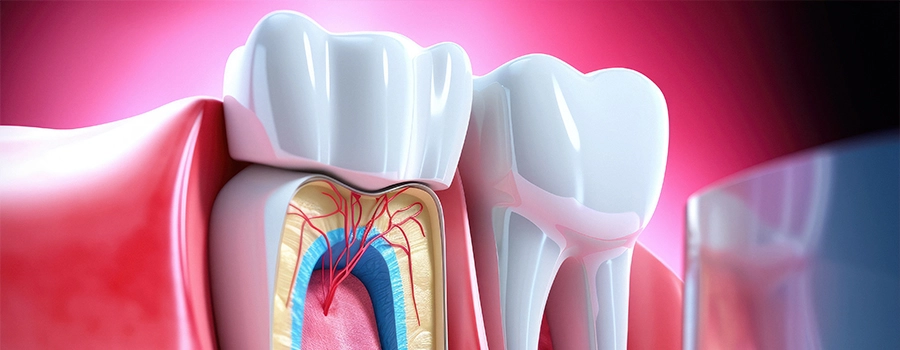Have you ever wondered whether your teeth are alive? When many people hear this question, their answer is “Teeth aren’t alive.” You, too, may not think of teeth as living—but healthy teeth are indeed alive. So does the universal rule of death for living organisms apply to our teeth as well? What does it mean when the nerves inside a tooth die? What factors lead to tooth-nerve death, a term often mentioned by dentists?
In the content we’ve prepared for you, we’ll explore questions like “What is tooth-nerve death?” and “What conditions result in the nerves inside a tooth dying?” By learning the signs and symptoms, you’ll gain insight into this condition and be able to protect your dental health with early treatment. If you’re ready, let’s dive into the detailed answers!
What Is Tooth-Nerve Death?
Teeth consist of a combination of hard and soft tissues. The pulp, which houses the nerves, is responsible for tooth vitality. Injuries, decay, or trauma can damage these nerves.
Once damaged, the nerves stop receiving blood flow, and bacteria take advantage—spreading infection rapidly. Unable to withstand the bacterial attack, the nerves gradually die. This process is known as tooth-nerve death.
Continue reading to learn the causes of tooth-nerve death and what steps you can take if it occurs.
What Are the Causes of Tooth-Nerve Death?
There are many reasons why a tooth’s nerve may die. For instance, a hard blow to your mouth can damage—and ultimately kill—the nerve. To determine the exact cause, a detailed oral examination is needed. Clinically, the most common direct causes include:
Infection: Poor oral hygiene accelerates bacterial growth. Initially, surface bacteria cause abscesses accompanied by swelling and pain. Untreated, the infection cuts off blood flow, leading to nerve death.Trauma: Physical injury—whether you notice it or not—can rupture the tooth’s blood vessels. Even if some blood flow remains, the nerve will eventually die from oxygen deprivation.Tooth Decay: When decay reaches the innermost layer of the tooth, it provides a direct pathway for bacteria to infect the nerve. The rapidly spreading infection disrupts blood flow, starving the nerve of oxygen and causing its death.Repeated Procedures: Preparing a tooth for a crown involves significant removal of tooth structure, which can severely damage the pulp and result in nerve death, just like other injuries.
Treatment for Tooth-Nerve Death

Tooth-nerve death is a serious condition. A dying or dead nerve must be treated promptly to prevent bacterial spread and potential tooth loss. After evaluating your case, your dentist may recommend root canal therapy. In some situations, extraction of the entire tooth may be considered.
Regardless of the approach, taking advantage of early treatment is critical. Teeth are highly susceptible to infection, and the oral environment is ideal for bacteria to spread rapidly. If left untreated, a dead nerve can lead to a dangerous infection that may affect other areas of the body.
Also see: How Is the Dental Nerve Removed?
What Is Root Canal Treatment?
With root canal treatment, you can preserve your natural tooth. The dentist’s priority is to remove the infection from the root canals. During the procedure, an opening is created in the tooth, and the dentist carefully cleans out the infected pulp.
Once all infection is eliminated, the canals are filled, and a permanent filling is placed to seal the tooth. If the tooth becomes fragile afterward, a crown may be recommended for added support.
Root canal therapy is a commonly chosen method because it allows a dead tooth to be saved rather than extracted—an invaluable option for patients wishing to maintain their natural smile.
Frequently Asked Questions
What Is a “Dead” Tooth?
A tooth is considered “dead” when its internal nerve has died for any reason.
What Happens When the Nerve Dies?
A dead nerve can lead to various complications over time—most commonly tooth loss. It may also contribute to jaw and joint issues.
How Can You Tell a Nerve Has Died?
The most common sign of nerve death is darkening of the tooth. However, you may also observe swelling, bad odor, or abscess formation.
Does a Dead Tooth Hurt?
Surprisingly, a dead nerve often still causes pain. Although one might expect a dead nerve to be painless, patients frequently experience discomfort when nerve death occurs.
What Factors Lead to Nerve Death?
Bacterial infection, trauma, and poor oral hygiene can all cause a tooth’s nerve to die.
Can a Dead Tooth Undergo Root Canal Treatment?
Yes—root canal therapy is the standard procedure for treating a tooth with a dead nerve.


















































